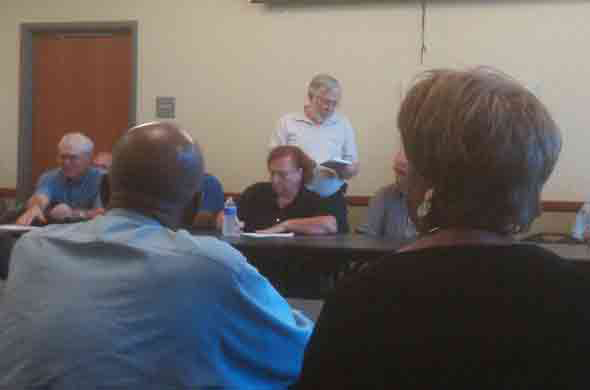 For the first time Monday, citizens gave their input to the city’s charter review commission.
For the first time Monday, citizens gave their input to the city’s charter review commission.
Some opposed changes, some wanted them and some wanted more information at the meeting at the Southeast Community Center.
The 13-member committee first summed up issues under consideration for any changes it recommends to the city council, which could or could not put them to a citywide vote.
Under consideration: create more council districts to make them smaller and provide minorities with more opportunity for representation, go to a stronger mayor form of government, remove city departments from the city charter, change election dates, and change a provision that forbids council members serving on some other positions or boards.
On Monday, commissioner Tim Kristl also suggested adding a look at term limits.
Some citizens praised the current system, in use for a half century, that has 13 council members, including the mayor, six members elected from geographic districts and six members who live in the districts but are elected citywide.
Lee Lambert, a northeast neighborhood activist, said, “I think everything should be left the way it is.”
Asked if the current system was so horrible that changes are justified, commissioner Duke Dujakovich answered, “That’s the question we’re asking too – is it broken and does it need fixing.”
Some minority representatives have agued for going to a system with nine council people all elected within districts and possibly three more elected at large, or for 12 council people all elected in districts. That would make districts much smaller and help offset the advantage of big money in elections, supporters say.
On Monday, former councilman Richard Tolbert suggested making wards into districts with councilmembers elected from each one – creating more than 30 councilmembers.
Lambert said that St. Louis has 28 aldermen and can’t get anything done.
Anita Russell, president of the Kansas City branch of the NAACP, was among those who said more information is needed before any changes.
Dujakovich said data does not provide solid answers; it shows cities have different systems but what results from that is complex.
“From all the data we’re compiling trying to draw a logical conclusion the only logical conclusion you can have is there is no logical conclusion,” he said.
Commissioner Rodney Knott said: “Denver is not Denver because of its form of government – Denver is Denver because of the people who live in Denver… being engaged in the process.”
There will be another public meeting Aug. 19 in the northland, and commissioners say they expect to start deliberating on recommendations after that.



Who’s talking